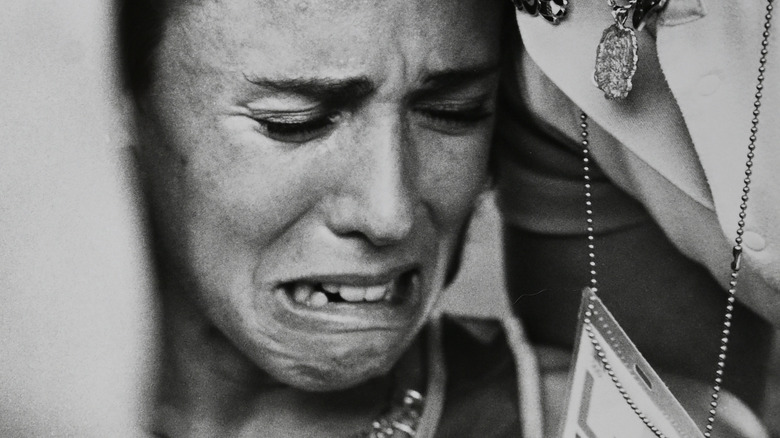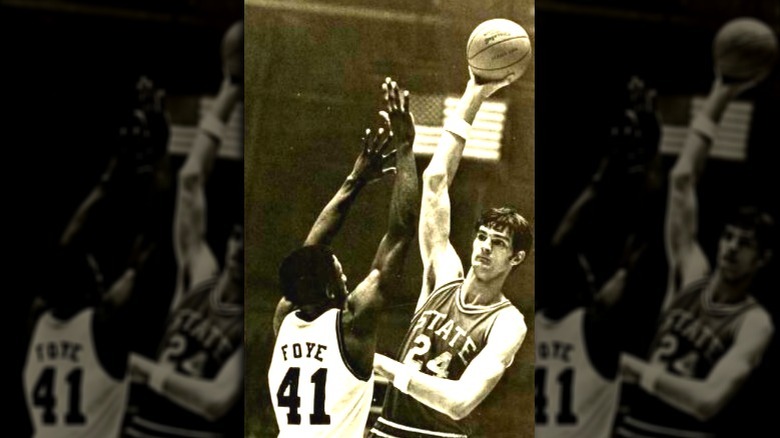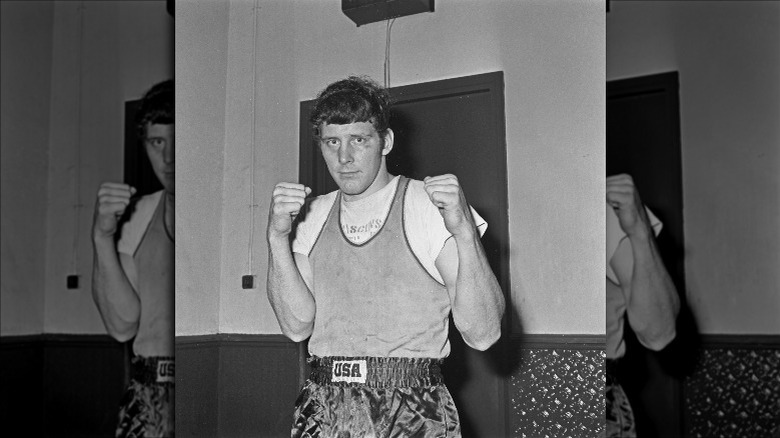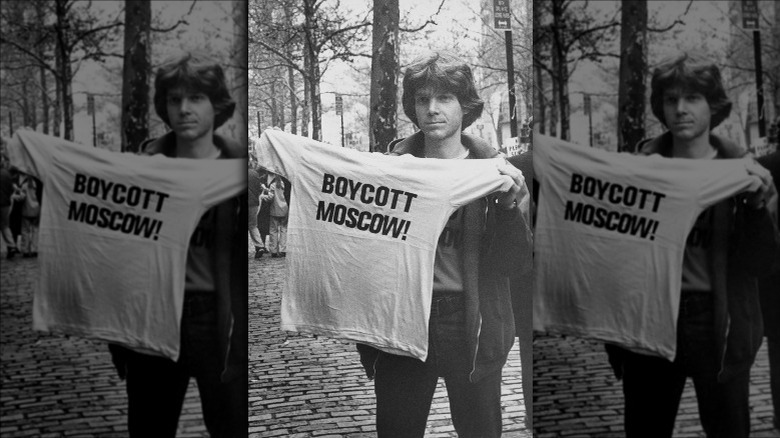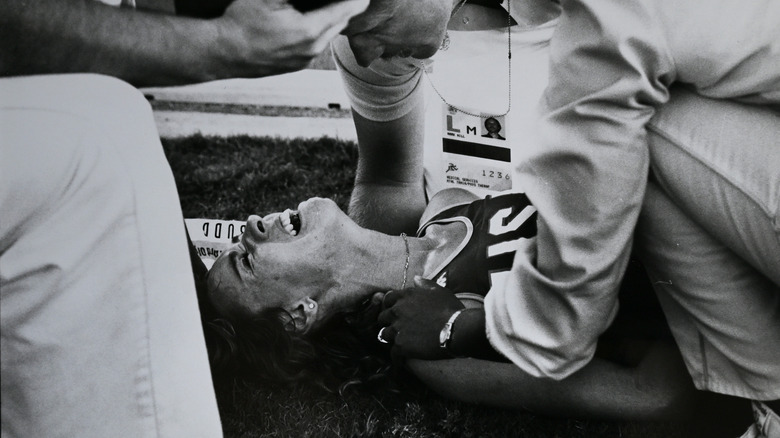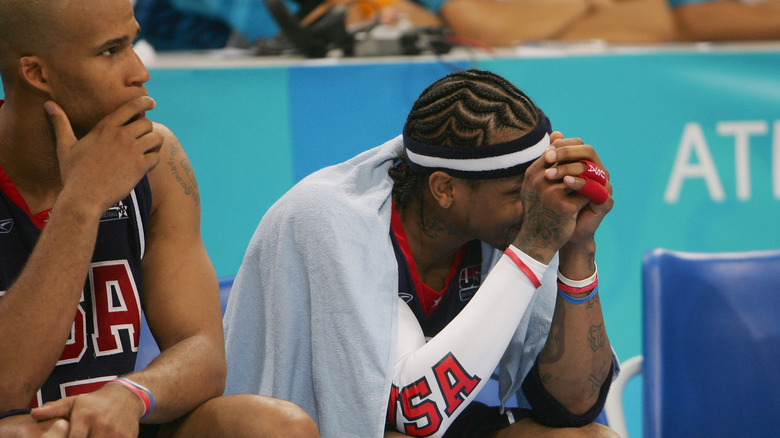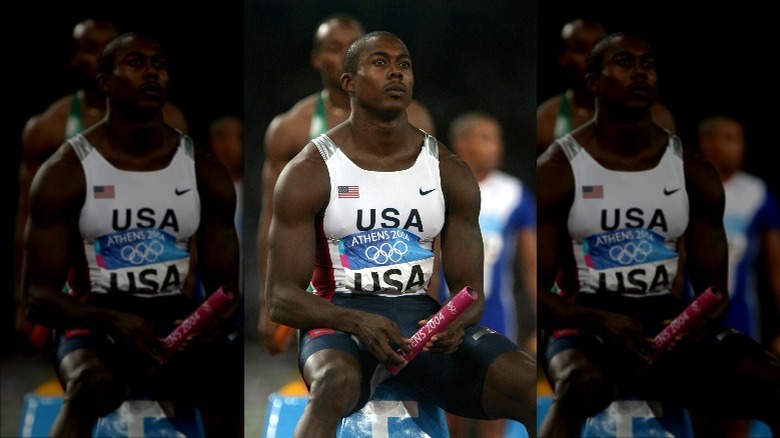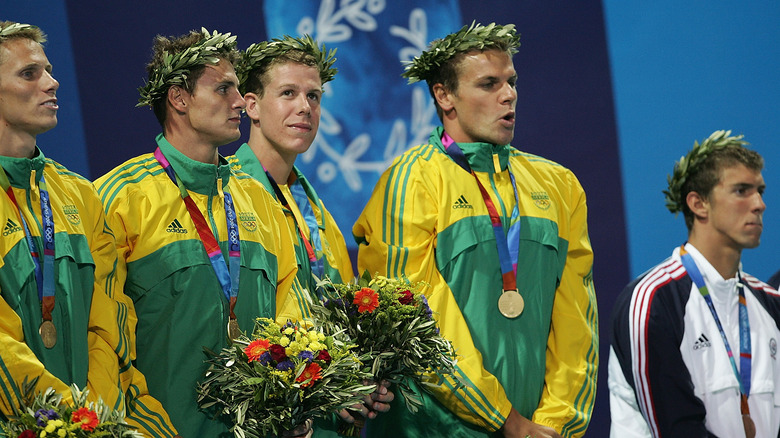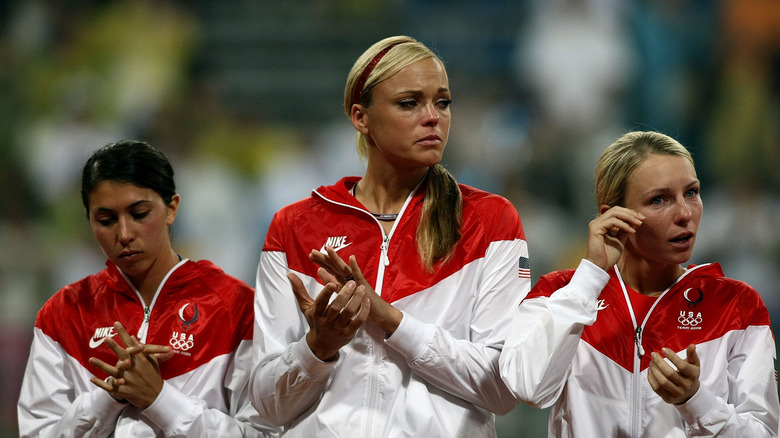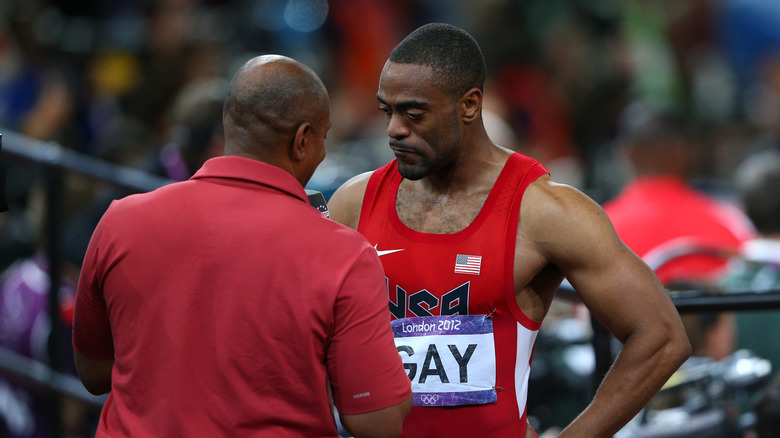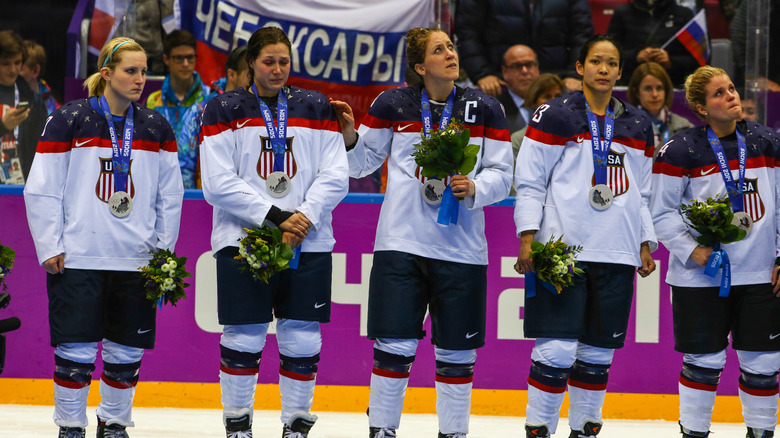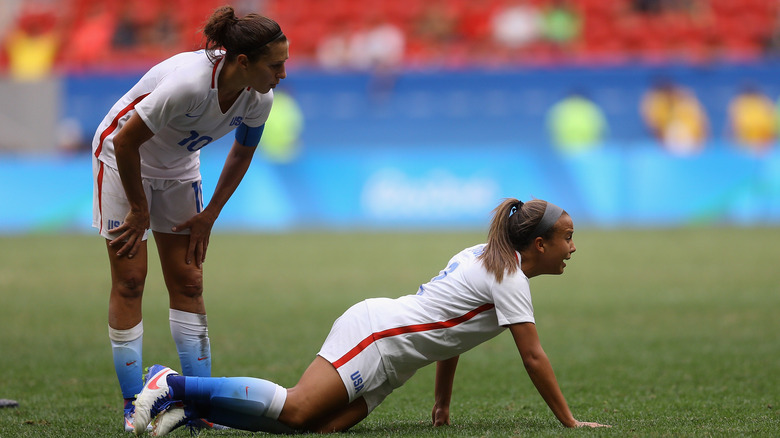The Most Heartbreaking Team USA Moments In Olympic History
The United States is used to doing pretty darn well at the Olympics. As the richest country in the world by GDP, and one where winning sometimes seems like it's everything, there is a lot of funding and opportunity for those who show the potential to become sporting greats.
While the U.S. loves its professional sports personalities, it's the Olympics that brings out the real over-the-top expectations. Maybe it's because the whole country unites behind a single athlete or team. Maybe it's because the Olympic Games only happen every four years. Or maybe it's because winning at the Olympics makes the U.S. winners on the world stage. Whatever it is, previously unknown amateurs can have the expectation of greatness thrust upon them seemingly overnight.
And while it may not happen often, some athletes are put on that preemptive pedestal only to come crashing down. Sometimes at the Olympics, U.S. hearts are broken and expectations dashed, in front of the whole world. These are the most heart-breaking Team U.S.A. moments in Olympic history.
The 1972 men's basketball team
The 1972 Olympic men's basketball final has gone down in history as one of the most chaotic, ridiculous, and unfair events at the games ever. The men's U.S.A. basketball team was the best in the world even before professionals were allowed to play at the Olympics starting in 1992. Going into Munich, they were the clear favorites, and indeed, Sports Engine says that they made it to the gold medal match almost effortlessly, winning every game they played. In the final, they faced Cold War adversary the U.S.S.R., so tensions were high.
With three seconds remaining in the game, the U.S.A. was down by one. A free throw tied it up. A second free throw went in and the Soviet coach called for a timeout, which was denied under international basketball rules, but the referee stopped the game when he saw the coach making a commotion. Now there was one second on the clock.
The ref decided play should continue, but for seemingly no reason and with no precedent, nternational Basketball Federation (FIBA) secretary general Renato William Jones said to set the clock back to three seconds. Making a somehow long story short, the Soviets were then given two more inbound passes for very sketchy reasons, and finally made a basket, winning the game 51-50. The U.S.A. appealed the loss, but the five-person panel voted along political lines and gave the gold to the Soviets by a 3-2 decision.
Duane Bobick in the 1972 men's heavyweight boxing
According to the Guardian, boxers from the U.S. had won gold in heavyweight divisions in all three Summer Olympic Games of the 1960s. And not just any boxers, but Cassius Clay (later Muhammad Ali), Joe Frazier, and George Foreman. There was no question Duane Bobick was going to win in 1972 and go on to be just as big a name. Except, you've never heard of Duane Bobick, have you? Well, he was cocky going into the Munich games, with plenty of knockouts and titles to his name. He'd even written an autobiography, which hadn't been published yet, so that he could add a chapter about winning Olympic gold.
In the third round, not even a medal match, Bobick faced Teófilo Stevenson of Cuba. Bobick had only fought Stevenson once before and he had beat him soundly. As he told reporters, Bobick was sure his opponent "couldn't have improved that much in a year." It only took three rounds for Bobick to find out how wrong he was. "I had a bad day," he said.
Stevenson went on to win gold, but refused to leave his communist homeland and turn pro. "No, I will not leave my country for one million dollars or for much more than that," he said. "What is a million dollars against eight million Cubans who love me?"
The 1980 Moscow boycott
If you are good enough to make it to the Olympics, you give up everything in life to train, and there might be only a small window of time you are in peak shape to qualify to go. So just imagine how the U.S. team felt when, just months before they were supposed to attend the Moscow 1980 games, their lifelong dreams were shattered.
After the Soviets invaded Afghanistan, President Jimmy Carter announced, "I've sent a message today to the United States Olympic Committee spelling out my own position that unless the Soviets withdraw their troops within a month from Afghanistan that the Olympic Games be moved from Moscow to an alternate site or multiple sites or postponed or canceled." He wouldn't get his way on any of it, so the U.S. (along with many other countries) boycotted the Olympics.
"It was really devastating, but I said okay, there's these next four years and I can hang around until 1984," modern pentathlete Mike Burley told USA Today. "Which I did, but I didn't make it." Rower Anita DeFrantz said, "Nobody knows us. We were invisible. We still are invisible. We are the team with no results."
Forty years later, the athletes got a sort-of apology from the United States Olympic and Paralympic Committee, which said, in part, "It's abundantly clear in hindsight that the decision to not send a team to Moscow had no impact on the global politics of the era and instead only harmed you."
Mary Decker in the 1984 women's 3000 meters
Runner Mary Decker was one of the athletes who was supposed to compete in the 1980 Moscow games but couldn't because of the U.S. boycott. So it was an even bigger deal when she came into the 1984 Los Angeles Summer Olympics as the favorite in the 3000-meter race, and on her home country's turn to boot.
Her competition, Zola Budd, was technically banned from the Olympics, by virtue of being from South Africa, since athletes from that country were not allowed to compete while forcing Black South Africans to live under apartheid. But Budd managed to get a spot on the British team because she had a grandparent who was born there. (She also, notably, ran barefoot.)
According to Runner's World, Decker was ahead until the midpoint of the race. That was when Budd overtook her. But something went wrong. A small collision between the two when Budd passed Decker resulted in the latter falling to the ground. Photos from the moments after show all the unbridled anguish in Decker's face, a second Olympic gold taken from her. And Budd would only end up coming seventh out of the ten runners who finished. Amazingly, the two athletes have since become friends.
The 2004 men's basketball team
Because of the weird rules the Olympics has around some sports, specifically basketball, players who are the furthest thing from amateurs are allowed to compete. This means that Team U.S.A. has in recent decades been stacked with some of the best NBA players, perfectly illustrated by the 1992 Games' "Dream Team." But only eight years later, the U.S. had a nightmare on the court.
Things started out badly, according to ESPN, when the U.S. lost to Puerto Rico (which plays under its own flag at the Olympics) a shocking 92-73 in their opening game. But the NBA's official site records that it would be a loss to Argentina that knocked them out of the medals. In a performance seen as proof the rest of the world was catching up to the U.S. men in quality of play, Argentina won 89-81.
One of the stars of Team U.S.A., Allen Iverson said, "We fought as hard as we could. We couldn't get it done for whatever reason. They were a better team than us." Argentina's coach, Ruben Pablo Magnano said, "They have the best basketball players in the world. Today, we realized, nothing is impossible." The U.S. would go on to win the bronze, and Argentina would take gold.
The 2004 men's 4x100 relay
The U.S. learned at the Athens Games in 2004 that even if you have some of the fastest men in the world over 100 meters, if you are going to put them together in a relay team, you might need to learn how to do the whole relay part of the race. Not doing so would end up resulting in a loss that didn't have to be.
As the New York Times reported, other relay teams practiced together for weeks, considering, you know, they were going to be in the Olympics and all. But the U.S. attitude seemed to be that because Maurice Greene, Shawn Crawford, Justin Gatlin, and Coby Miller were really fast in their individual events, they would have no problem with the relay. As a result, Green said, "We don't work on our handoffs every day."
That was an understatement. The foursome had only practiced handing off the baton together twice. So in the final, when Gatlin and Miller fumbled their handoff, it ruined their flow and ended Team U.S.A.'s lead. As an excuse, Gatlin said, "the crowd was very loud." Miller explained, "I never heard [Gatlin] call, 'Stick' ... I slowed down to make sure I got the baton." Then Miller stepped on Gatlin's foot so hard the latter's shoe tore. In the end, Great Britain would pull off a shocking win, finishing just one-hundredth of a second ahead of the U.S. If they'd practiced those handoffs more, the U.S. likely would have won easily.
The 2004 men's 4x100 free relay
According to Swimswam, the U.S. men's swim team had dominated the 4x100 free relay for decades, winning at seven straight Olympics, until it all changed at Sydney 2000. Perhaps helped along by their home crowd, the Australian team took home the gold in style. So going into the 2004 Olympics, the teams were always going to have a big rivalry. The Australians had an in-his-prime Ian Thorpe, but the U.S. had a young guy named Michael Phelps who seemed like he had real potential. If that wasn't enough, the Dutch had the 100 free world record holder, Pieter van den Hoogenband, while the Russians were the 2003 World Champions.
It was going to be an exciting race, but the U.S. needed to prove that 2000's loss was a one-off. And surely, considering what he went on to do, you would think this would be when Phelps got one of his many, many, many gold medals.
Instead, something almost no one was expecting happened. The South African team had the swim of their lives. And indeed, of the entire world's lives, because they not only won, but they also smashed the world record in the process. While they had done well in the prelims, they had no standout swimmers, no 100 fly prodigies, no medals at major international events, and a relatively young team. In 2003, they had only come in 8th at the World Championships. Yet in the end they won, and the U.S. had to settle for a distant bronze.
The 2008 softball team
Softball hasn't been in many Olympics. While it was brought back for the delayed 2020 Tokyo Games, before that it hadn't been included as an Olympic sport since 2008. USA Today reports that softball was only added in 1996, meaning it only got four Olympics before being removed. And part of the reason might have been that, for the first three of those four, the U.S. team won the gold each time.
So going into 2008, knowing the sport was not planned for the 2012 London Games, Team U.S.A. wanted to go out on a high. After all, it's pretty impressive to say your country won every single gold available in a given sport. There was no reason to think they wouldn't. The stats reported by the New York Times are truly incredible: Team U.S.A. had beaten "22 consecutive opponents dating to 2000 [and] outscored its 2008 Olympic opponents, 57-2." Before these Olympics, the U.S. hadn't even trailed their opponents in a game for eight years.
In the final, the U.S. faced Japan, which was no concern, since they'd beaten the same opponents two times already in that very Olympics. But the defending champions three times over fell apart, giving up their first earned runs of the whole tournament. Though they were behind, they had ample opportunity to make a comeback, loading the bases with only one out not once but twice. Both times went nowhere. In the end, they lost 3-1.
The 2010 and 2014 men's hockey teams
The U.S. men's ice hockey team wasn't expected to make the final at the 2010 Olympics, according to the New York Times, so the fact that they did was already a Cinderella story. They'd done incredibly well, never falling behind their opponents during the tournament. It looked like there was a chance this was the team that could end the U.S.' 30-year gold medal dry spell.
So it was disappointing when Canada went up 2-0, making it look like the U.S.' impossible dream was dead. But then the U.S. scored and, with only 24.4 seconds left in the game, they tied it up. This exciting comeback made it all the more disappointing when they lost 3-2 in overtime.
Surely, after that exciting if disappointing result, Team U.S.A. would mount a comeback in 2014. Well, you know what article you're reading. This time, Bleacher Report says, there were expectations a win was possible. But then the U.S. didn't even make it to the gold medal match, instead facing Finland to fight it out for a mere bronze. Still, at least that's a medal, right? The tenor of the game was perhaps best illustrated by the two goals Finland scored in the second period ... within 11 seconds. In the end, the U.S. lost 5-0. Team captain Zach Parise said, "It's kind of disappointing, a little bit embarrassed for what happened, especially today. It wasn't a good effort by us."
Tyson Gay in the 2012 men's 100 meters
In his prime, Tyson Gay was the fastest man in American history, according to ESPN. But that qualify is key: at the 2012 London Olympics, Gay was labeled –- accurately –- the "second-fastest man in history" by the announcer when he walked out for the 100-meter final. And for an Olympian and someone that exceptional at what they do, being just second best overall had to sting. Plus, Gay had baggage from the 2008 Olympics, when a hamstring injury meant he didn't qualify for the 200 meters at all and didn't make the 100-meter final, and he messed up the baton handoff in the 4x400 relay heats, so he didn't make that final with his team either.
So making the 100 meter final four years later was a chance at redemption, the kind of sports story the public just eats up. Of course, you might already know who won the race: the fastest man in history, Usain Bolt, who defended his gold medal. But Gay's loss was even more tragic, because he didn't get silver either, and he lost out on bronze by just one-hundredth of a second.
Missing out on yet another Olympic medal really affected Gay. He was sobbing as he told reporters after the race, "I really tried to do it for my family, but I came up short. I felt like I ran with the field and I just came up short. That's all I did."
The 2014 women's hockey team
It's a cliché that Canadians are good at hockey. And the Canadian women's Olympic ice hockey team are doing nothing to dispel that stereotype — they are really, really good at hockey. Unfortunately, Bleacher Report says the team that seems to suffer the most under their dominance is Team U.S.A. Going into the 2014 Sochi Olympics, Canada had won gold the past three games, beating Team U.S.A. in two of those finals. They hadn't even lost a single game at the Olympics in 16 years. But when the great rivalry came together again at the 2014 final, it was going to be a chance for the U.S. to finally come out on top.
Near the end of the third period, the U.S. was up 2-0. It looked like the impossible was going to happen. Then Canada scored with 3:26 left on the clock, pulled their goalie, and scored again with less than a minute left. With a tie score, the game went into overtime. In a chaotic mix of power plays, penalties, and lots of open ice, Canada managed to score again, winning the gold again.
Bleacher Report did not mince words when covering the U.S.A.'s loss, writing "It was a disastrous result for the Americans. There is no other way to look at it. To be up two goals on their archrival in the biggest game of their lives and lose the way they did? It's an unmitigated Olympics disaster."
The 2016 women's soccer team
The U.S. women's soccer team has been the best in the world, by a large margin, for basically its whole history. In a sport that was considered a boy's club in most countries, American women shone. Fans of the women's team could be certain they'd be rooting for them in the final of almost any tournament. But slowly other countries strengthened their women's teams, and the U.S. finally saw some competition. One team that was especially worrisome was Sweden.
As player Christen Press said in 2021, "In world championships, we always play Sweden at some point." According to the Los Angeles Times, the teams had clashed eight times out of a possible 12 in World Cups and Olympic Games up until that point. And none was more painful than at the Rio Olympics in 2016.
Until that point, the U.S. women's soccer team had made the final of every single major tournament it played in. But at those Summer Games, they didn't even make the semifinals. All thanks to Sweden, the Washington Post reports, when a 1-1 tie after extra time went to penalties, and the U.S.A. got 3 to Sweden's 4.
